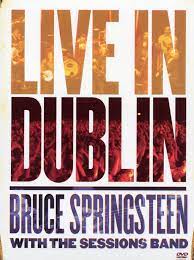BRUCE SPRINGSTEEN WITH THE SESSIONS BAND : LIVE IN DUBLIN
- Atlantic City
- Old Dan Tucker
- Eyes On The Prize
- Jesse James
- Further On (Up The Road)
- O Mary Don't You Weep
- Erie Canal
- If I Should Fall Behind
- My Oklahoma Home
- Highway Patrolman
- Mrs. McGrath
- How Can A Poor Man Stand Such Times And Live
- Jacob's Ladder
- Long Time Comin'
- Open All Night
- Pay Me My Money Down
- Growin' Up
- When The Saints Go Marching In
- This Little Light Of Mine
- American Land
- Blinded By The Light
Bonus Tracks : - Love Of The Common People
- We Shall Overcome
Label : Sony Music
Venue : The Point Theatre, Dublin, Ireland
Recording Date : November 17, 18 & 19, 2006
Release Date : 2007
Length : 130 minutes
Review (AllMusic) : Live in Dublin by Bruce Springsteen with the Seeger Sessions band documents the final show of the group's long tour in support of the album that took them across the U.S. and Europe. Along with performances from the album itself, the show is peppered with readings of Springsteen's own tunes. The deluxe double-CD contains 23 songs performed by a 17-piece band that included a full horn section and backing chorus, numerous guitars, dobro, banjo, keyboards, accordion, field drums, sousaphone, euphonium, pedal steel, fiddles, standup bass and more. We Shall Overcome: The Seeger Sessions was recorded by a band that captured immediacy: a certain raw savoir faire and a bristling kind of joyous energy that a large group of musicians who were getting to know one another recorded at Springsteen's home studio. In this package, these songs, most of which come from out of history and time, are performed by a band that is a spit-shined, polished, and utterly prepared and professional unit. It's not surprising. Springsteen's a perfectionist anyway, and some of the rough edges left on the studio album were a surprise (a welcome one), here they've been honed and sharpened and this band could play with anybody. There is something cooler about this performance but its sheer musicality is a wonder. The horn charts are brilliant; there is room in some of these tunes - such as "Erie Canal" - for old New Orleans jazz-styled soloing and interplay; the time keeping as rhythm is captured not only by drums and bass, but by the chorus, and in lead and duet vocals. "Atlantic City" opens the show. It's radically rearranged as a monotone blues song. Other utterly reworked versions of Springsteen tunes, such as "If I Should Fall Behind" (a 19th century waltz that becomes a communal sing); a country version of "Highway Patrolman" and "Long Time Comin'" from Devils & Dust. There's an overly long, radical redo of "Open All Night" as a late-'50s rock & roll song with a very polished Andrews Sisters-styled female chorus which is joined a male one in call and response - it's like you're hearing something from Pump Boys at the Dinette. And there are more surprises with other tunes from Springsteen's past. From The Seeger Sessions material there's a new version of Blind Alfred Reed's "How Can a Poor Man Stand Such Times and Live" complete with added lyrics; it's raucous and forceful. "O Mary Don't You Weep" is better than the take on the studio album. "Jacob's Ladder" (a Seeger original) is a wild gospel romp with full-on horns and popping snare. Springsteen's inventive folk song treatment of "When the Saints Go Marching In," and the rowdy gospel number "This Little Light of Mine" close the show. While there are many more notable moments here, there are three bonus tracks: a Cuban son version of "Blinded by the Light," and live versions of "Love of the Common People" and "We Shall Overcome," recorded for The Seeger Sessions but not used on the final disc. They add to the great sense of musical heritage that gave birth to the project in the first place. The latter tune is a defining moment: it's an underspoken element of surprise that closes the entire release with a moving, communal and spiritual dignity. It's also the only song here that doesn't feel like a number Springsteen has remade in his own musical image. Ultimately, this set feels not so much like a recording of the music of the "people" any longer, but more like another live - and far more musically adventurous - Bruce Springsteen record. Not that there is anything wrong with that. With Live in Dublin, something is lost as well as gained: it feels as if all of these songs - not just the ones he penned - have now become a part of Springsteen's catalog rather than a part of his repertoire.
